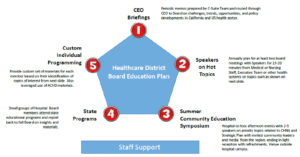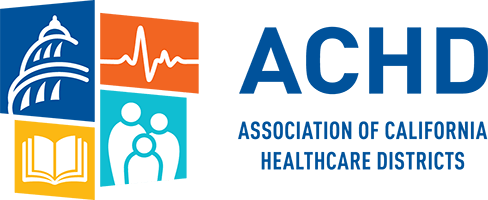Board Education Programming Discussion Guide
Watch the Board Education Programming Webinar Here
Download the Session Slides Here
Prepared by
James A. Rice, Ph.D.
Brian E. Rice, MHA
Series Preface:
This discussion guide is part of an “ACHD Governance Toolkit” composed of a series of six recorded webinars organized by the Association of California Healthcare District (ACHD) to encourage and support healthcare district boards of directors to further enhance the performance of their governance models and practices. The six topics addressed are:
- Community Engagement
- Balancing Governance & Management
- Board Orientations
- Strategic Planning
- Board Self-Assessments
- Board Education Programming
The six programs consist of an approximately 15-minute video with a downloadable slide deck, and a short discussion guide to stimulate healthy conversations between the CEO and the board about practical ways they can collaborate for more effective and efficient board decision making in each topic. The programs are also intended to help encourage healthcare districts to consider the successful completion of ACHD Certification.
The ACHD Certified Healthcare District Program promotes good governance for healthcare districts by creating a core set of accountability and transparency standards. This core set of ACHD standards is known as Best Practices in Governance and districts that demonstrate compliance are designated by ACHD as a Certified Healthcare District for a period of three years. Find more information on our website.
Each of the six webinars can be optimized when the Board Chair and CEO collaborate to organize a five-step program of education for the coming year.
The five-step process for your board-CEO conversation to address these topics is suggested to be:
- The CEO and Board Chair reaffirm their shared commitment to the continuous enhancement of the board’s education and capacity development. Jointly express this commitment at the beginning of each year.
- Adopt a board policy of continuous board development that embraces:
* Periodic CEO briefing materials on topics relevant to the strategic plans and challenges of the healthcare district.
* A calendar of speakers in routine board meetings on hot topics to help the district’s vitality.
* Organization of a “Symposium” on board best practices with other community organizations and associations for joint learning and community leader networking.
* Participation in small groups of district board members at ACHD or other state conferences on strategic issues and trends.
* Organization of customized educational readings or mentors for each board member based on their unique needs and requests. - Organize a 30-minute educational session during a Spring and Fall board meeting to focus on one or more of the six Webinar topics. Ask one board member to team with a member of management and/or the staff to jointly present, and help guide the discussion around the webinar and this Discussion Guide. This team approach helps build interest, ownership and shared responsibility among the board for its ongoing development.
- Encourage all board members to watch to the short video recording of the webinar before the scheduled discussion session. All should come to the discussion session ready to contribute in these ways:
* Assess how well this topic is being addressed in your healthcare district;
* Bring questions and ideas about how your district might better address this topic in the future; and
* Bring some suggested resources that might help your healthcare district enhance its learning and planning for this topic. - Conduct a collegial assessment of each program to see how its value to your district could best be optimized in the coming year. Share your ideas with the ACHD staff.
Thank you again for all you do for the people of your healthcare district, and for the enhanced performance of your healthcare district board work!
Contact ACHD staff at any time with questions, or contact us at jim_rice@governakadimi.org
Let’s begin moving though this discussion guide.
Board Education Programming
Introduction
Thank you for your interest in exploring how your healthcare district board might better understand and develop its capacity for enhanced board education.
This discussion guide is not a stand-alone document. The guide is to be used in conjunction with the corresponding recorded webinar and slide deck. We see board education as essential to continuously strengthen the work and performance of your healthcare district governance.
We encourage your board and CEO to collaborate in conversations and shared strategic thinking and planning to support your board members, individually and collectively, to be more effective in establishing and nurturing new strategies and structures for board education.
This Discussion Guide is organized to answer these questions:
- What is a good “board education program”?
- Why is it important?
- Common issues or challenges?
- What can boards do to be more successful?
- Where to secure resources for further educational insights on this topic?
Within each of these five sections, we pose a series of questions to guide your conversations about how best to establish and support board education programming as a means to better accomplish the mission of your healthcare district.
1. What is a good “board education program”?
For California healthcare districts, we see board education as a diverse and multi-media set of learning experiences for board members to continuously enhance the effectiveness of their work in three levels:
- Collective decision-making by the full board to help ensure healthcare district performance and vitality
- Committee effectiveness and impact for the board’s overall performance
- Personal growth, effectiveness, and pride of individual board members
Learning experiences may involve all of these possible opportunities: publications, mentors, conferences, speakers, webinars, and a variety of other methods.
The content addressed in these educational programs are usually driven by the board’s self-assessments; challenges of the Brown Act; ACHD Certification criteria, and the unique dimensions of the healthcare district’s strategic plans.
Questions that can help your board strengthen your board education programming include:
- When was the last time you updated your board’s policy requiring each board member to participate in continuing board education to enhance their effectiveness?
- If you are planning to update your ACHD Certification, are there specific topics you believe the board will need to better understand and master to help achieve certification?
2. Why is it important?
Investing in a well-designed board education program is not a “nice to have” initiative. It is an essential strategy because:
- The health sector is complex and rapidly changing, for all types of healthcare districts.
- Community leaders may have limited insights into the regulatory/fiduciary duties of California healthcare districts and high performing nonprofit governance best practices.
- Each board member is unique, as are their interests and educational needs.
- Healthcare districts have a small number of board members so access to diverse expertise can be constrained.
- The board can set a tone for continuous growth and development from the top for executives, staff and other community leaders, but this requires superior knowledge about the needs of the district and their ever-changing technologies, competencies, and strategies for the long-term vitality of the healthcare district.
- The board will find it easier to attract and retain excellent board members when the board decision-making culture is guided by modern knowledge and learning methods and systems.
Discussion questions to stimulate board and CEO conversations in this sphere of education are:
- How would you evaluate the effectiveness of your current board educational programming? What are strong features that should be retained or enhanced? What are aspects that should be expanded or improved upon?
- How would you measure the value of or returns from investing in enhancing your board’s educational programming?
3. Common issues or challenges?
Good board education is essential for good board work, but it is not easy to design, develop and conduct good board education and learning experiences. We find these as common obstacles to overcome:
- Lack of time and budget
- Lack of enthusiasm from CEO and Board Chair
- Lack of governance model to which educational programming is directed for continuous performance enhancements
- Unwillingness to borrow concepts and ideas from the boards of other service/membership industry governing bodies (hotels, banks, chambers of commerce, colleges, churches)
- Lack of commitment from board members to improve their work
To significantly advance the impact of and effectiveness for your board work, we suggest you have conversations around your answers to these discussion questions:
- How might you encourage and motivate each board member to be more receptive to continuous board education and development?
- How might you adapt board education polices and programming from other boards in your region, or from other ACHD member organizations to enhance your board’s engagement for improved board effectiveness and pride?
4. What can boards do to be more successful?
Our work with health sector boards across California and the US has identified many initiatives to enhance board and CEO investments into board educational programming. Key strategies are:
- The board establishes a culture and policy frame that continuous board development is valuable and essential to the district’s vitality
- Make education a part of the board member’s job description
- Drive education topics by the district’s strategic plan and community health needs assessment (CHNA)
- Be creative with who you invite from within and outside the healthcare district
- Build educational experiences around practical case studies and multi-media learning opportunities (See exhibit below)

We encourage you to explore practical ways to expand and enhance your education programming by addressing these questions:
- How might you best ask each board member the top 1-2 topics they would like to know more about in the coming year? Their topics can be content for the educational programming.
- How can you rely on the results of your regular board self-assessments to shape the design and topics for your board education?
- How much should you budget for next year to support a robust educational program?
- How might you explore ideas for education with the ACHD staff? Are you regularly sharing insights into the district’s educational needs with ACHD?
5. Where to secure resources for further educational insights on this topic?
Your healthcare district has many options of where to turn for educational program design ideas and support. These sources should be of particular value in this year’s planning:
- State Association Education: ACHD
- IHI Boards and Quality Programming
- State Hospital Programs: Washington
- Public Health Institute Programs
- California Nonprofit Association
How might your board best explore ways to refresh and enhance your board educational programming for the coming year? Do you have other sources of ideas for great board development efforts?
Please reach out to ACHD staff for comments or suggestions to improve this board development discussion guide and webinar.
And thank you for all you do for the people you exist to serve in your healthcare district!
